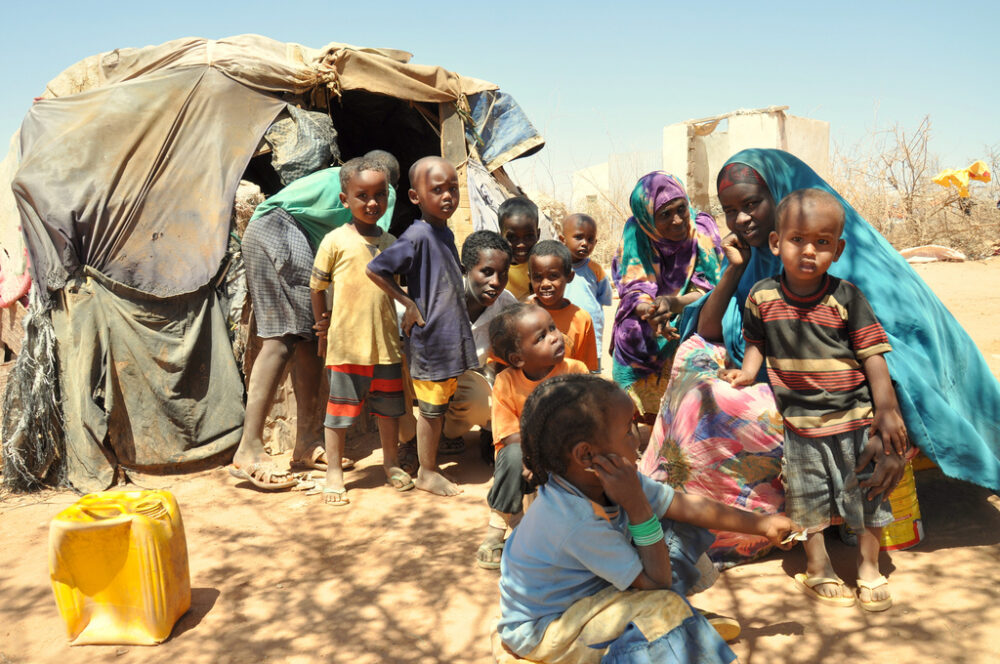According to the United Nations Refugee Agency, in 2020, 82.4 million people worldwide were forcibly displaced from their homes, almost double the number in 2010. Forty-two percent of displaced people in 2020 were children.
The number of refugees worldwide is rising, but the United States is accepting less and less. In Barack Obama’s last full fiscal year (FY) in office, 99.99% of refugee spots, which his administration capped at 85,000, were filled up. Meanwhile, in Trump’s last full FY in office, that proportion sank to 65.63 percent out of a total of 18,000 spots — which at that point was the smallest refugee ceiling in American history. The suspension of the refugee resettlement program for about four months in 2020 to limit the transmission of COVID-19 in the United States, as well as the drastic decrease in international travel and claim processing due to the pandemic, certainly limited the number of refugees able to file for refugee status that year. However, this does not explain why, in FY 2020, among all who were able to file a claim for asylum (for which refugees already in the U.S. apply), only 26.3% were accepted. This cannot be entirely attributed to the country’s leadership at the time because in FY 2021 — during which the Biden administration raised the refugee ceiling from 15,000 to 62,500 — only 11,411 refugees were admitted.
Per the Immigration and Nationality Act, the only thing that should decide whether someone is granted refugee or asylum status is if the individual has “experienced past persecution or [has] a well-founded fear of persecution on account of race, religion, nationality, membership in a particular social group, or political opinion.” Unfortunately, human imperfection gets in the way of implementing the law to the same degree of precision as the written law. Refugees may not have crystal-clear memories of their traumas for a variety of reasons, and the natural mistakes they make are often misinterpreted as signs of lying by even the most well-meaning immigration officials. There is rarely any evidence or other witnesses to support a refugee’s story, so law enforcement and legal professionals scrutinize the only source of information they have: the refugee’s testimony. In doing so, court officials may view erroneous memories as deception as a result of their unfamiliarity with how memory works and how trauma can rewire the brain — but this has potential to change through education.
When people recall a certain event, their idea of what actually happened is warped by their current feelings and worldview.
Even people who are not refugees have memories that are far from perfect. It is common knowledge that as time passes it becomes harder to remember a past event. In fact, the mind starts to integrate more and more details from schema — mental frameworks of events based on prior first-hand and second-hand experiences.
Memory, both what one remembers and how one remembers it, is flexible. The brain encodes only what is useful in that moment and what, based on experience, is likely to become useful in the future. An experience is even warped by how many times one has recalled it; some people may subconsciously add more details to a memory the more they remember it (hypermnesia). At the same time, people often forget peripheral details the more they try to remember central details. Outside information can add to or distort one’s version of events, whether it comes from the news or other people — think about how the events that force migration become big news stories and how refugees share their experiences with people they meet in densely populated refugee camps. But people don’t need to hear a detail from the news or another person to accept it as part of their memory. A 2001 study quizzed 11 people on their diary entries from 10 years prior and found that 21.5% of 514 fabricated events, created by the study’s administrators and distributed across all participants’ questionnaires, were believed to have happened.
Ordinary people are often terrible at remembering the date, duration, frequency, and chronology of an event. Many studies have found that people can be off by months when estimating the date of an event, even if it was personal, important, or traumatic. Calculating a repeated event’s frequency is influenced by how easily the event can be remembered and how often it is recalled. Repeated events may also blend into one another.
Furthermore, when people recall a certain event, their idea of what actually happened is warped by their current feelings and worldview. The evolutionary function of autobiographical memory is to help individuals keep social bonds, define their sense of self, and guide present thoughts and behaviors. A refugee’s memory has a different function before and after migration because their relationships, identity, and routine have turned upside-down.
A refugee’s memory has a different function before and after migration because their relationships, identity, and routine have turned upside-down.
Refugees may have also experienced trauma and may feel depressed, helpless, angry, and anxious, which further disrupts memory. A 2021 analysis of medico-legal affidavits of 193 asylum applicants from 90 countries found that 69% had post-traumatic stress disorder (PTSD) and 55% had depression. The same review found that people with PTSD or depression were three times more likely to have memory issues.
A review of autobiographical memory and mental health research on refugees and asylum seekers published in 2021 found that people with PTSD and depression have trouble with their autobiographical memory and have more overly-general or incomplete memories compared to people without these afflictions. Additionally, it found that depressed refugees recounted less specific autobiographical memories than those who were not depressed.
Nevertheless, there is a lot of conflicting research about how stress, trauma, and PTSD affect memory. This is likely because of how uniquely PTSD manifests and people process their trauma. People can suffer from intrusive thoughts, causing them to re-experience traumatic events, and other times be unable to recall those events due to functional avoidance. Some studies have found that high emotion improves memory of an event; others have found that it blurs the details. Some have concluded that the memories of people who have experienced trauma are quite malleable; others say that traumatized people hardly ever change their stories.
Trauma can also have lasting effects on cognition: one’s thinking, working memory (a continuously updating mental dashboard of one’s surroundings), mood, and attention. Some refugees even experience short-term memory loss which seriously interrupts their daily activity.
A 1996 neuroimaging study of Vietnam combat veterans with PTSD found that there was relative deactivation in the brain’s Broca area, which has an important role in verbal expression, when they were exposed to reminders of their experiences. Other studies found that when people remember traumatic events they activate brain regions responsible for intense emotions and decrease activity in regions responsible for inhibiting emotion. This may mean that when retelling their stories, refugees painfully re-experience the emotions they felt at the time and have increased difficulty staying focused.
A 2021 analysis of medico-legal affidavits of 193 asylum applicants from 90 countries … found that people with PTSD or depression were three times more likely to have memory issues.
Typically, immigration judges and asylum adjudicators assume refugees are lying when they struggle to remember details and maintain a consistent narrative. But these are difficulties faced even by non-traumatized people, and it’s inaccurate to assume that people should have precise memories of their traumas. Not to mention, a practiced liar could be extraordinarily detailed and consistent.
Asylum officers can also bring some biases to the interrogation table. The investigator bias is the propensity of those who are looking for deception to find it. Cultural biases are also likely at play because people from different cultures have different speech patterns that may result in misunderstandings, and their memories have different focal points. Memories of people in collectivist cultures center on social relationships and general routines, while memories of people in individualist cultures revolve around their unique experiences and are more detailed — and it’s often the case that refugees are coming to individualist cultures from collectivist cultures.
There are a variety of ways that law enforcement and legal professionals can better understand refugee claimants: by learning about basic memory processes, the diversity of PTSD symptoms and cultural differences, and by practicing non-adversarial behavior. There are even proposed strategies for asking questions in a particular way and order to get the most accurate information.
The Biden administration has set the refugee cap for FY 2022 to 125,000, the largest since 1993. The United States will have more opportunities to accept refugees, thereby changing and saving lives.
For further reading:
- International Journal of Refugee Law (2010). DOI: 10.1093/ijrl/eeq041
- Applied Cognitive Psychology (2012). DOI: 10.1002/acp.2852
- Frontiers in Psychiatry (2021). DOI: 10.3389/fpsyt.2021.658700
- Memory & Cognition (2001). DOI: 10.3758/BF03195747
- PLoS ONE (2021). DOI: 10.1371/journal.pone.0247033
- Frontiers in Behavioral Neuroscience (2013). DOI: 10.3389/fnbeh.2013.00094
- Annals of the New York Academy of Sciences (2006). DOI: 10.1196/annals.1364.022
- Archives of General Psychiatry (1996). DOI: 10.1001/archpsyc.1996.01830050014003
- https://www.unhcr.org/refugee-statistics/
- https://www.americanimmigrationcouncil.org/research/overview-us-refugee-law-and-policy
- https://www.cnn.com/2020/08/12/politics/refugee-admissions-coronavirus/index.html
- https://trac.syr.edu/immigration/reports/630/
- https://www.cnbc.com/2021/10/08/biden-administration-falls-short-of-fiscal-year-2021-us-refugee-admissions-cap-.html
- https://www.state.gov/refugee-admissions/about/
- https://www.migrationpolicy.org/programs/data-hub/charts/us-annual-refugee-resettlement-ceilings-and-number-refugees-admitted-united


